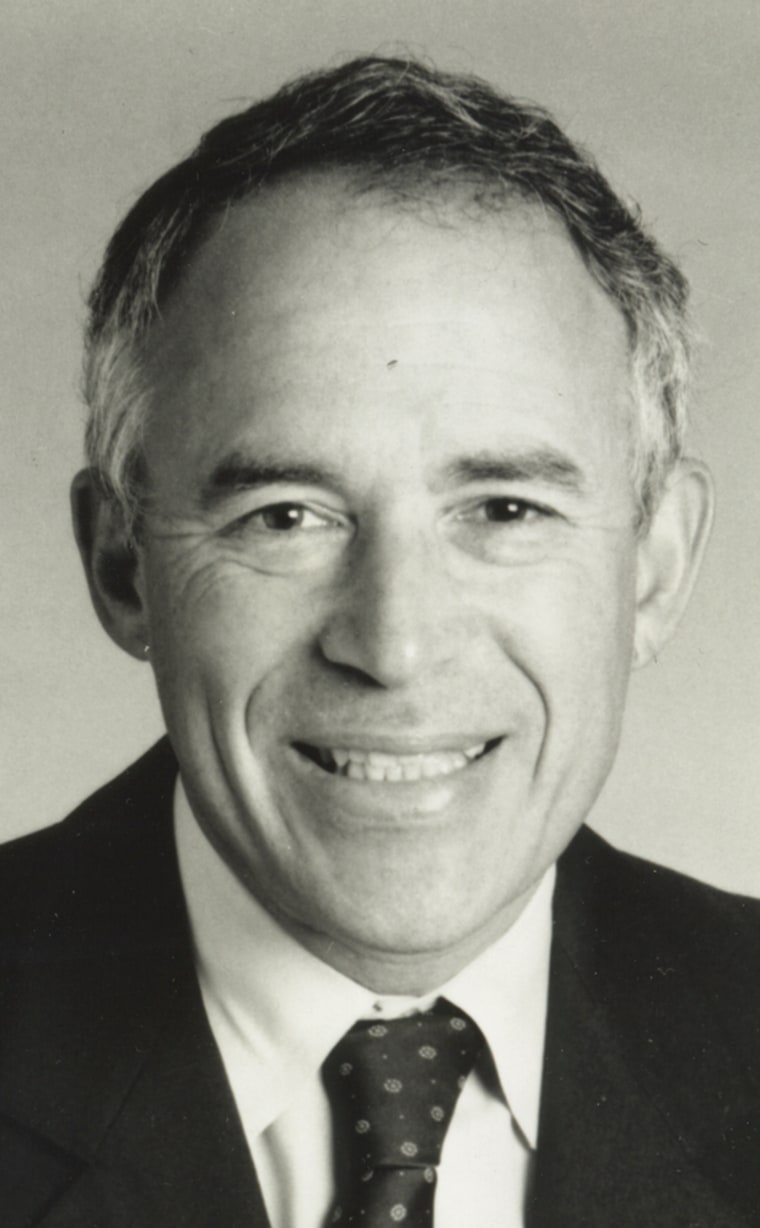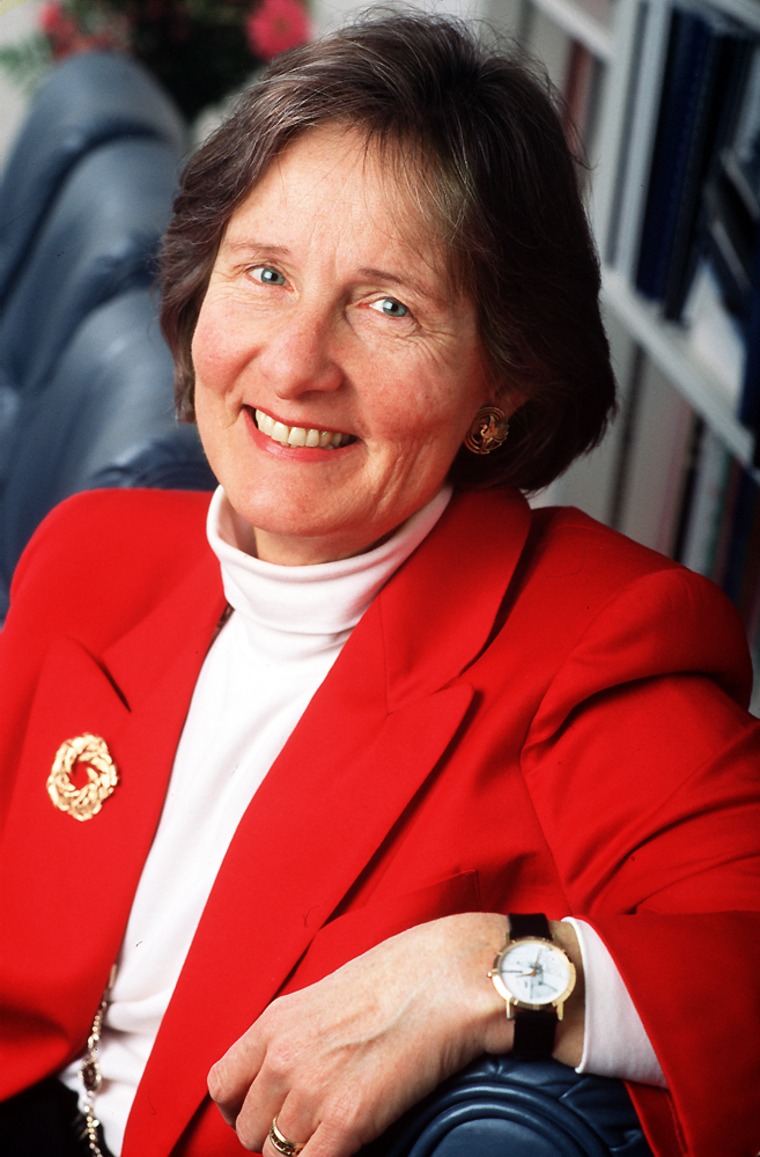Hillary Rodham Clinton's political science professor said he'd give the tactic an "F."
It was early 1993, in the first days of the Clinton administration, when Hillary Clinton's friend and former thesis adviser at Wellesley College took the phone call that would land him in the middle of a political intrigue.
"I got a call from someone at the White House — I don't remember who — shortly after the inauguration, saying the Clintons had decided not to release her thesis," professor Alan H. Schechter told MSNBC.com.
"I said, 'Why? It's a good thesis.' I got some mumbo jumbo about how they were beginning to work on health care and she had criticized Sen. Moynihan in the thesis, and didn't want to alienate him."
In fact, the thesis from 1969 contains not a negative word about Daniel Patrick Moynihan, the late Democratic senator from New York, and Schechter allows that the real source of fear must have been the subject of the academic paper: Chicago radical organizer Saul Alinsky.
[See the main story: Reading Hillary Rodham's hidden thesis.]
‘Quite naive’
"I argued with them that they should release it," the emeritus professor said in the telephone interview from North Carolina, one stop on his tour of Wellesley alumnae groups to discuss their favorite topic these days, the political development of Hillary Clinton.
"The more you hide something, the more people will want it," Schechter said. "It was a stupid political decision, obviously, at the time."

Schechter, a Clinton supporter who has contributed money to her campaigns, said that hiding the thesis, which got an "A" grade, was one of many "quite naive" decisions by the Clintons in those early days — he also lists making gays in the military the first priority, and trying to do too much with her health care plan. But liberals, he said — and he counts himself among them — tend to overreach instead of taking the incremental approach.
After the call from the White House, Wellesley's president, Nannerl Overholser Keohane, consulted with lawyers and closed access to any thesis written by a U.S. president or first lady, a rule affecting only Hillary D. Rodham's thesis. Keohane moved on later that year to be president of Duke University, and now is a visiting professor at Princeton, where she teaches political philosophy, leadership and feminist theory. An Arkansan who was eight years ahead of Hillary Rodham at Wellesley, Keohane is a regular contributor to Democratic candidates and to a congressional PAC that gives exclusively to Democrats, including Hillary Clinton.

When MSNBC.com called Keohane last week at Princeton to ask about the thesis, she replied, "I have no memory of this," and hung up the phone. To give her time to gather her thoughts, MSNBC.com e-mailed questions to her, and she replied, "I do not recall this situation, and cannot help you with this issue. You will need to rely on the people at Wellesley who are more current on this issue than I am."
Wellesley's assistant vice president for public affairs, Mary Ann Hill, told MSNBC.com that she had no information on whether the action was requested by the Clintons. Keohane closed access to that thesis in early 1993, Hill said, because "there was enough ambiguity about the application of copyright law, and the decision was made to err on the side of caution."
The policy was reiterated in writing in 1995, Hill said, by the current president of the college, Diana Chapman Walsh. Three classes ahead of Hillary Rodham at Wellesley, Walsh also is a regular contributor to Democratic candidates, including Hillary Clinton.
The life of the thesis out of the closet could be short-lived. If Clinton won the presidency, under the policy her thesis would again go back under wraps. Hill said that if Clinton were elected, the college would probably re-evaluate what policy was best.
‘It is available at Wellesley’
MSNBC.com asked Sen. Clinton, through her office and presidential campaign staff, whether she would consent to an interview to discuss the thesis and whether she would give permission for MSNBC.com to publish the paper in full. Her Senate staff declined the interview request, and her presidential campaign staff did not reply.
As for allowing the thesis to be published, Clinton's senatorial spokesman, Philippe Reines, said in an e-mail, "You need to contact Wellesley about their policy regarding the release of student work, and seek permission from them." Of course, as Wellesley pointed out, it's the author, not the college, who holds the copyright.
When asked why the Clinton White House had wanted the thesis hidden from the first generation of Clinton biographers, Reines would neither confirm nor deny that the Clintons had requested Wellesley's action. Instead he referred to the current situation. "Senator Clinton's thesis is available to the public, as is any other Wellesley graduate. If someone wants to read it, it is available at Wellesley."
Besides being available for reading, but not copying, at the Wellesley archives (on the fourth floor of the library, Monday through Friday), the thesis can be read at your local library — one library at a time, that is. A single copy, on microfilm, can be ordered from Wellesley on a 30-day interlibrary loan.
While the traveling copy raises the possibility that someone could check out the microfilm, photocopy it or retype it, and post the text on the Internet, doing so would run the risk of a lawsuit.
The document has copyright protection, though not because the front of the library's copy is marked "c 1969 Hillary D. Rodham." That note, in a different typeface than the manuscript itself, was added by the university's archivist, Wilma Slaight.
"I added that in 1992," Slaight acknowledged. "That was my attempt to indicate that she might have copyright protection."
The attempt was unnecessary, said a copyright specialist, professor Laura N. Gasaway of the University of North Carolina at Chapel Hill. With or without the mark, an unpublished work is protected as soon as it's written, and the protection extends until 70 years after the author's death, Gasaway said. Readers can comment on the thesis, or publish limited quotations from it, but anyone who publishes the text could be liable for statutory damages of up to $150,000.
Of course, it's not clear whether a presidential candidate would want to draw even more attention to her writings on an old radical by suing.
